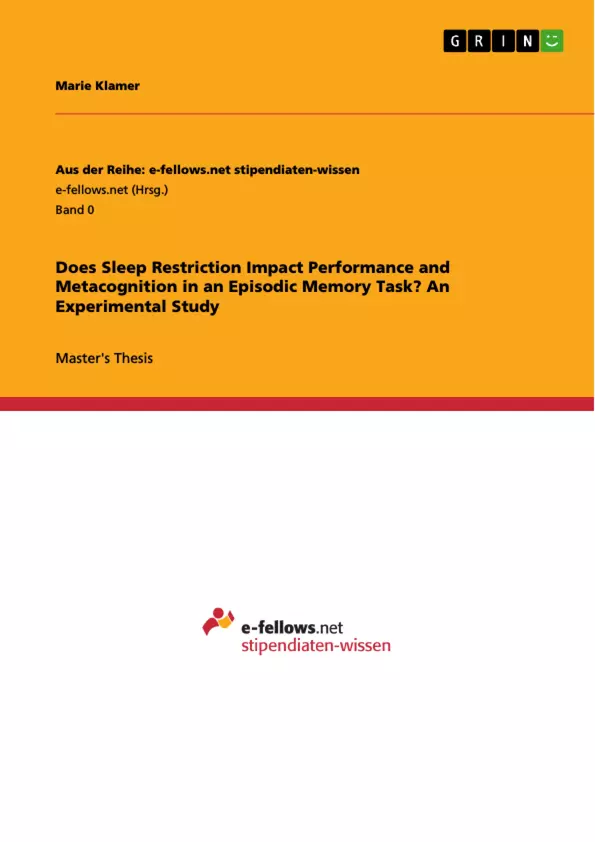Sleep restriction is common in adults and has been linked to impairments in cognition, such as memory performance. However, less is known about how sleep restriction affects metacognition, the ability to monitor one’s cognitive processes. This experimental study aimed to (i) investigate if sleep restriction negatively impacts episodic memory performance and (ii) to examine if sleep restriction negatively affects two aspects of metacognition (confidence bias and metacognitive sensitivity).
Using a within-subjects design, 148 participants performed an episodic memory task after two nights of restricted sleep (4h/night) and two nights of saturated sleep (9h/night) in a randomized order. The episodic memory task comprised the encoding and retrieval of indoor and outdoor images. Participants provided a confidence rating for each trial. Mixed model analyses revealed that participants performed less accurately after sleep restriction, were more confident in their performance, and had lower metacognitive sensitivity.
Inhaltsverzeichnis (Table of Contents)
- Sleep and the effects of sleep deprivation
- Sleep and memory
- Metacognition
Zielsetzung und Themenschwerpunkte (Objectives and Key Themes)
This experimental study investigates the impact of sleep restriction on both episodic memory performance and metacognition. The study aims to determine if sleep restriction negatively affects memory accuracy and two key aspects of metacognitive ability: confidence bias and metacognitive sensitivity.
- The influence of sleep restriction on episodic memory performance
- The role of sleep in metacognitive processes, specifically confidence bias and metacognitive sensitivity
- The potential implications of sleep restriction for decision-making and cognitive errors
- The significance of metacognition for everyday behaviors, including emotion regulation, medication adherence, and performance in various settings
- The relationship between sleep, metacognition, and psychiatric disorders
Zusammenfassung der Kapitel (Chapter Summaries)
- Sleep and the effects of sleep deprivation: This chapter provides a comprehensive overview of sleep, including its evolutionary significance, its various functions, and the different sleep stages. It also discusses the prevalence of sleep deprivation in industrialized countries and highlights the negative consequences of both total sleep deprivation and sleep restriction on cognitive function.
- Sleep and memory: This chapter focuses on the relationship between sleep and memory, particularly long-term memory. It explores the different types of memory, including procedural and declarative memory, and emphasizes the role of sleep in memory consolidation, encoding, and retrieval. The chapter also examines the impact of sleep deprivation on memory performance, particularly within the context of episodic memory.
- Metacognition: This chapter defines metacognition and explores its role in various cognitive processes. It discusses the importance of confidence judgments, differentiating between retrospective and prospective judgments. The chapter then delves into different measures of metacognition, including confidence bias and metacognitive sensitivity, highlighting their significance for decision-making and the potential impact of sleep restriction on these aspects.
Schlüsselwörter (Keywords)
The primary keywords and focus topics of this study include sleep restriction, metacognition, episodic memory, confidence bias, metacognitive sensitivity, decision-making, and cognitive errors. The study investigates the impact of sleep restriction on performance and metacognitive processes within the context of an episodic memory task, examining the potential implications for everyday behaviors and psychiatric disorders.
Frequently Asked Questions
How does sleep restriction affect episodic memory?
The study shows that participants perform less accurately in episodic memory tasks after restricted sleep (4 hours per night) compared to saturated sleep (9 hours per night).
What is metacognition in the context of this study?
Metacognition refers to the ability to monitor and regulate one's own cognitive processes, specifically focusing on confidence bias and metacognitive sensitivity.
What is the "confidence bias" mentioned in the research?
Confidence bias refers to the tendency of sleep-restricted individuals to be more confident in their performance despite being less accurate.
What is metacognitive sensitivity?
Metacognitive sensitivity is the ability to accurately distinguish between one's own correct and incorrect responses, which was found to be lower after sleep restriction.
Why is this research important for everyday life?
Understanding how sleep loss impacts decision-making and cognitive monitoring is crucial for safety-critical professions, medication adherence, and general mental health.
- Citar trabajo
- Marie Klamer (Autor), 2022, Does Sleep Restriction Impact Performance and Metacognition in an Episodic Memory Task? An Experimental Study, Múnich, GRIN Verlag, https://www.grin.com/document/1263725



